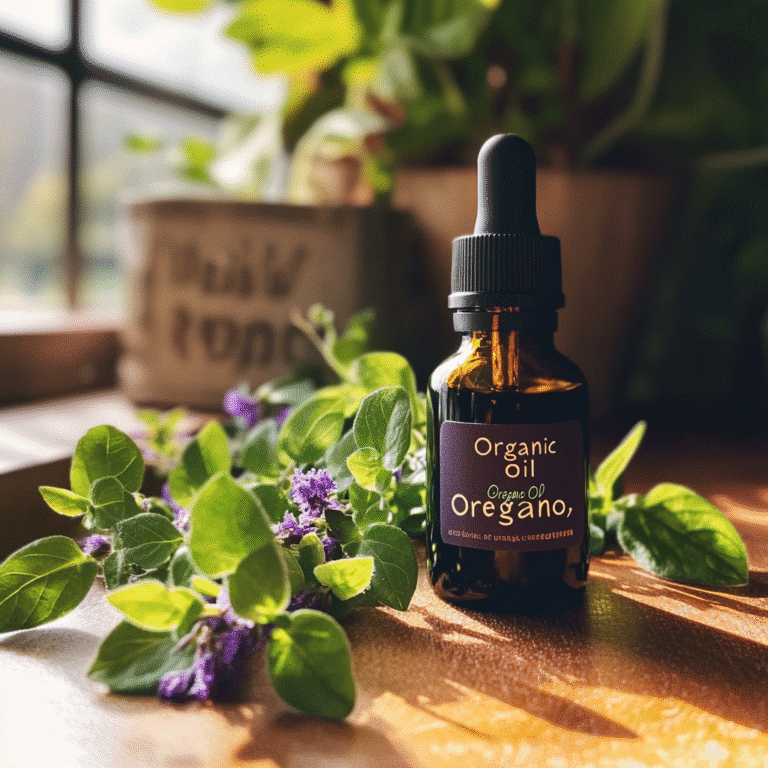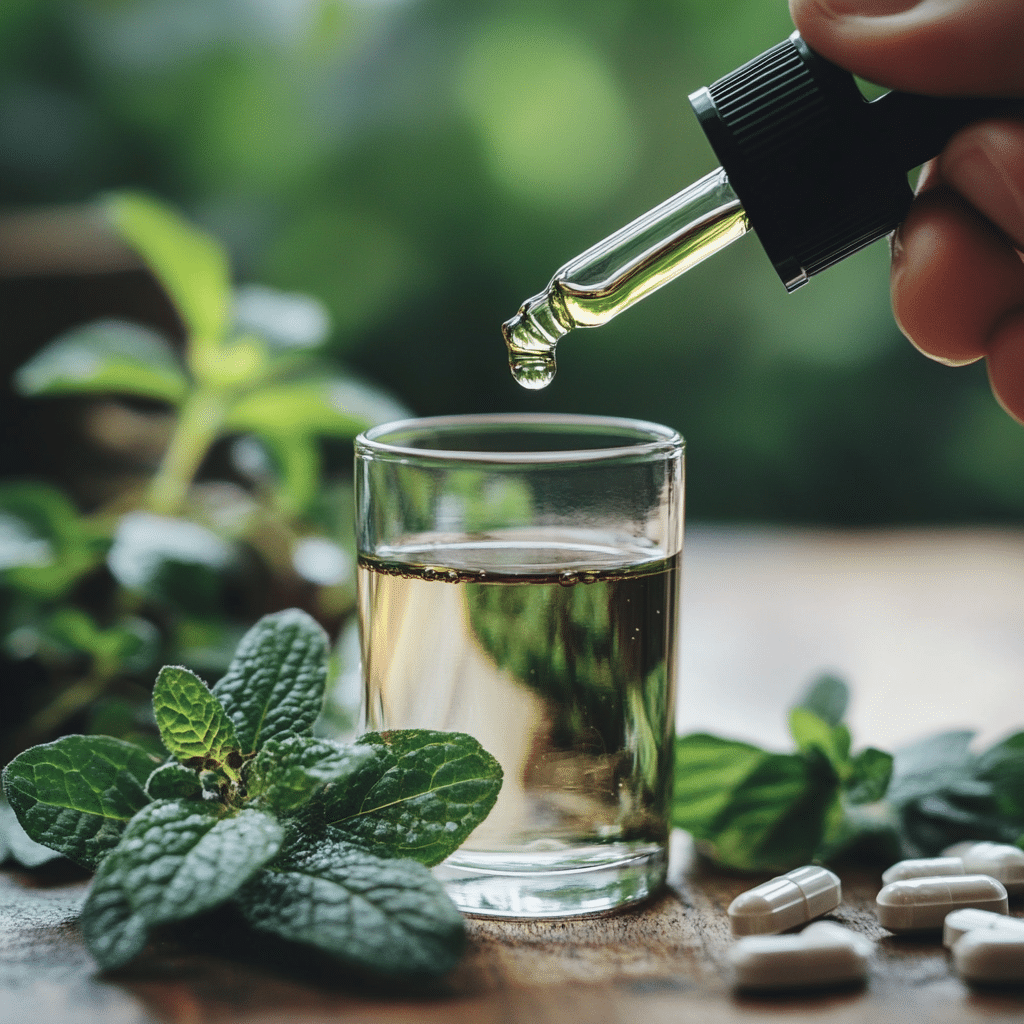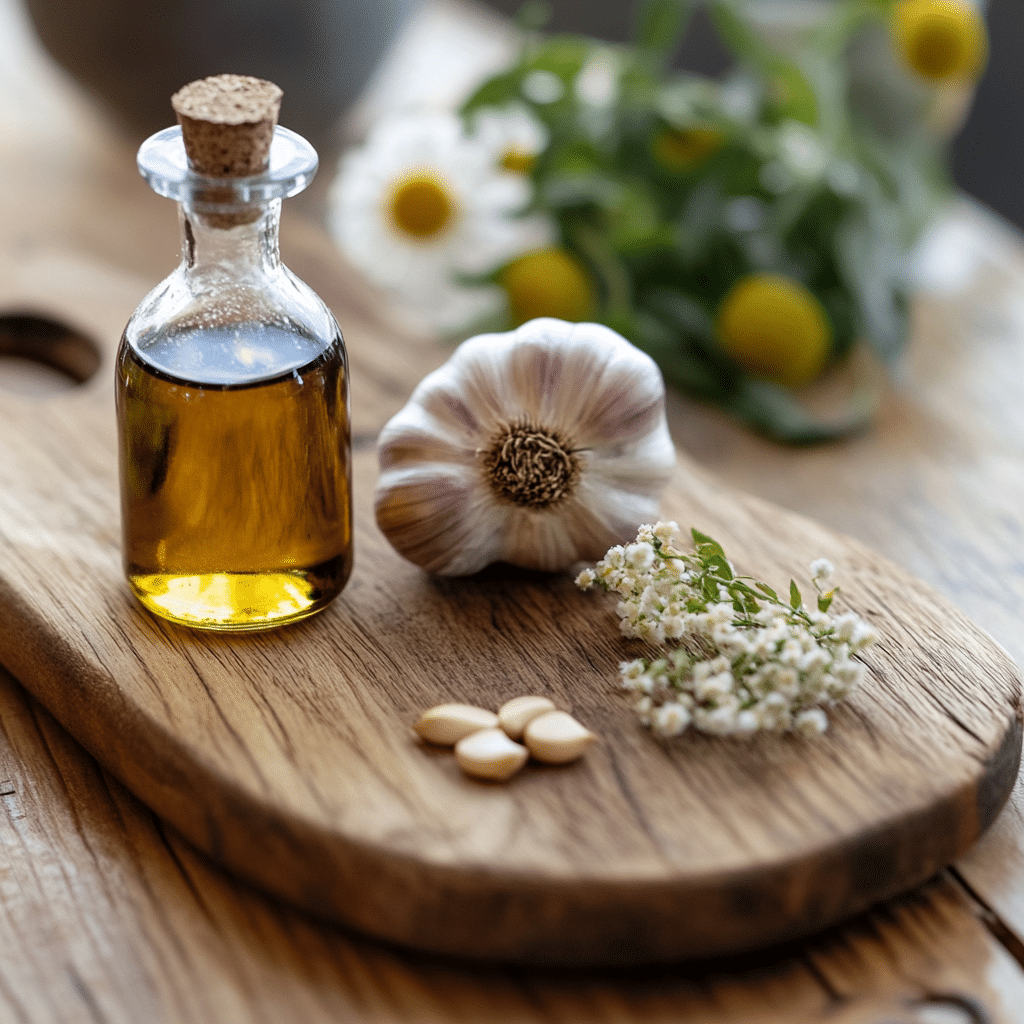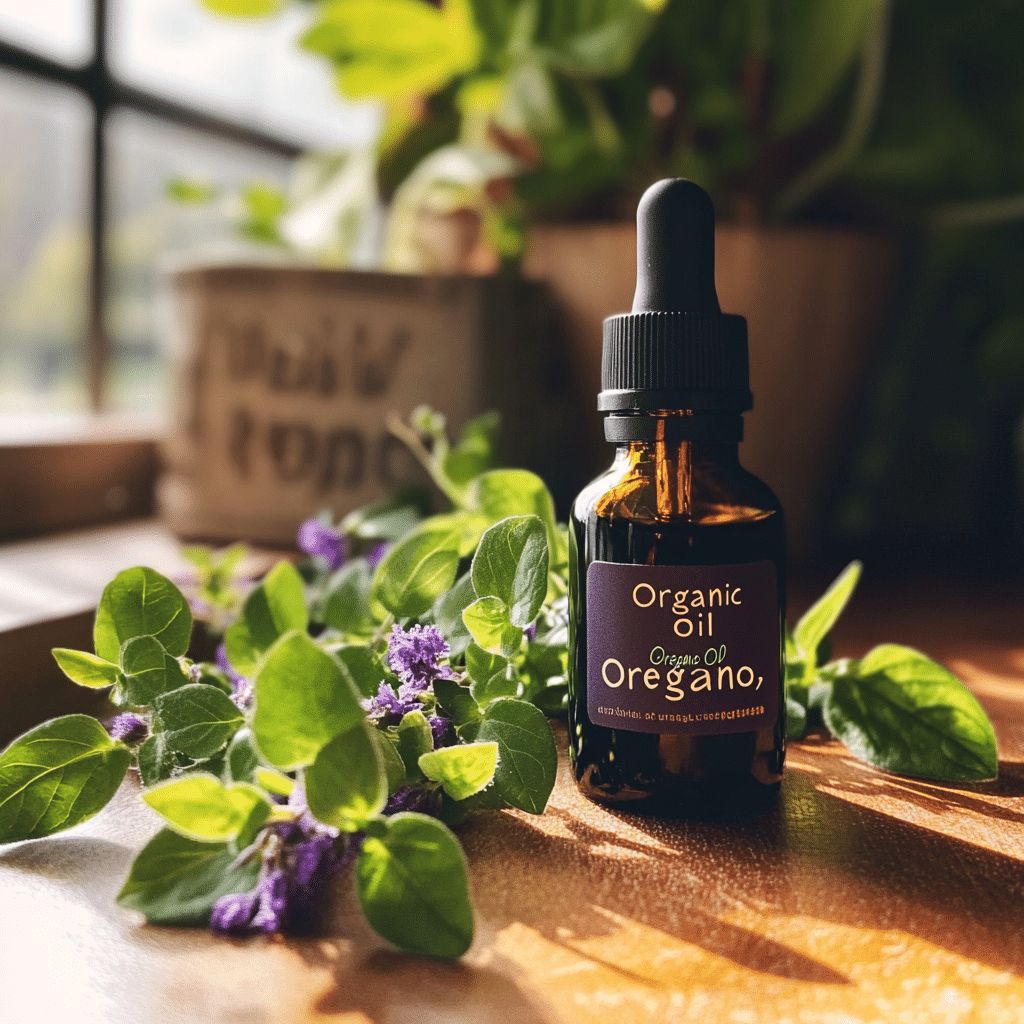Looking for a powerhouse natural remedy that’s been used for centuries and now backed by modern science? Organic oil of oregano is earning its place as one of the strongest herbal solutions on the market today. From fighting off harmful bacteria to soothing inflammation and boosting immunity, this essential oil packs a serious punch in a small bottle.
In this comprehensive guide, we’ll explore what makes organic oil of oregano so potent, how it can benefit your health, how to use it safely, and why it’s gaining popularity across the wellness community. We’ll also compare it with other natural antibiotics, address potential side effects, and answer your most pressing questions about daily use.
Don’t miss our Coconut Water with Pineapple – The Tropical Health Drink You Need for another natural wellness booster.
Table of Contents
ToggleWhat is Organic Oil of Oregano?
The Origins and History of Oregano as Medicine
Oregano, scientifically known as Origanum vulgare, has been a staple in Mediterranean medicine for thousands of years. Ancient Greeks used it for treating infections, while traditional Chinese medicine employed it for respiratory and digestive issues. Unlike regular oregano used in cooking, the oil of oregano—especially when organic—is concentrated and packed with medicinal properties.
Organic oil of oregano is derived from the leaves and flowers of the oregano plant. What makes it unique is the extraction process and the purity of the raw materials, grown without pesticides or synthetic fertilizers. The result? A pure, potent oil packed with nature’s defense molecules.
How Organic Oil of Oregano is Extracted
There are several methods for extracting oregano oil, but steam distillation is the most common for organic products. This process involves passing steam through oregano leaves to release volatile compounds, which are then cooled and condensed into essential oil.
What sets organic oil of oregano apart is the absence of chemicals in the extraction and cultivation process. Organic certification ensures that:
- Plants are non-GMO
- No synthetic additives are used
- Soil health and biodiversity are preserved
These practices not only protect the environment but also contribute to a higher concentration of active ingredients like carvacrol and thymol—two of the most powerful natural compounds found in the oil.
Print
Organic Oil of Oregano – A Potent Natural Remedy Backed by Science
5 Stars 4 Stars 3 Stars 2 Stars 1 Star
No reviews
A natural remedy rich in carvacrol and thymol, organic oil of oregano offers potent antibacterial, antiviral, and antifungal benefits to support immunity and wellness.
- Total Time: 5 minutes
- Yield: Varies by use
Ingredients
Organic oregano essential oil (100% pure, steam distilled)
Carrier oil (olive, coconut, or castor oil for dilution)
Distilled water (for sprays and steam)
Raw honey (optional for syrups)
Fresh lemon juice (optional for syrups)
Witch hazel or rubbing alcohol (for antiseptic sprays)
Instructions
1. To use internally, dilute 2–4 drops of oregano oil in water, juice, or a carrier oil. Take for no more than 10 days at a time.
2. For cold or flu support, use 2–3 drops in hot water for steam inhalation or combine with raw honey and lemon for a cough syrup.
3. Apply topically by mixing 2 drops of oregano oil with 1 tablespoon of carrier oil. Use on skin infections, joint pain, or fungal areas twice daily.
4. To make a disinfectant spray, mix 10 drops oregano oil with 1/2 cup distilled water and 1 tablespoon witch hazel or alcohol. Shake well before use.
5. Cycle oregano oil use (10 days on, 10 days off) to avoid overuse or gut flora disruption.
6. Always do a patch test before using topically. Never use undiluted oil on skin or mucous membranes.
Notes
Organic oil of oregano is one of the most powerful natural remedies, thanks to its high carvacrol content.
Use only high-quality, certified organic oil for the best results.
Always dilute before using internally or externally to avoid irritation or side effects.
Avoid during pregnancy, breastfeeding, or while taking blood thinners without medical advice.
Best used short-term for immune support, respiratory relief, and combating infections.
- Author: Jessica Lupone!
- Prep Time: 5 minutes
- Cook Time: 0 minutes
- Category: Remedy
- Method: No-cook
- Cuisine: Herbal
Nutrition
- Serving Size: 2–4 drops
- Calories: 5
- Sugar: 0g
- Sodium: 0mg
- Fat: 0.5g
- Saturated Fat: 0g
- Unsaturated Fat: 0.5g
- Trans Fat: 0g
- Carbohydrates: 0g
- Fiber: 0g
- Protein: 0g
- Cholesterol: 0mg
Nutritional and Chemical Composition
Key Compounds: Carvacrol, Thymol, and Terpenes
The secret behind the strength of organic oil of oregano lies in its chemical makeup. Unlike culinary oregano, the oil is distilled to concentrate potent bioactive compounds that are scientifically recognized for their healing properties.
Here are the top active components you’ll find in quality oregano oil:
| Compound | Health Benefit |
|---|---|
| Carvacrol | Powerful antibacterial, antiviral, and antifungal agent |
| Thymol | Natural disinfectant and immune system supporter |
| Terpenes | Anti-inflammatory, antioxidant, and respiratory support |
| Rosmarinic Acid | Reduces allergic reactions and promotes detoxification |
| Beta-caryophyllene | Fights inflammation and supports gut health |
Carvacrol, which makes up 60–80% of the oil, is the real hero. Research shows it helps destroy harmful pathogens like E. coli, Salmonella, and even antibiotic-resistant bacteria. Combined with thymol’s antiseptic power, this duo makes oregano oil a top contender among natural remedies.
Why “Organic” Makes a Difference
There’s a big gap between regular and organic oil of oregano. Organic oils are extracted from plants grown without synthetic pesticides or herbicides, and the distillation process is kept clean, ensuring purity and potency.
Why does that matter?
- Higher Potency: Organic plants are often more nutrient-dense because they adapt to stress naturally.
- Cleaner Product: No chemical residue means safer ingestion or topical use.
- Better Absorption: Fewer contaminants allow your body to absorb beneficial compounds more effectively.
- Environmentally Friendly: Organic farming promotes biodiversity and healthy ecosystems.
Choosing organic not only supports your health but also contributes to sustainability—a win-win for both your body and the planet.
Science-Backed Health Benefits of Organic Oil of Oregano
Antibacterial, Antiviral, and Antifungal Properties
One of the most celebrated benefits of organic oil of oregano is its ability to combat harmful microbes. The key compound carvacrol has been studied for its effects against a wide range of pathogens.
A 2018 study published in Frontiers in Microbiology found that oil of oregano could effectively disrupt the membranes of antibiotic-resistant bacteria like MRSA, reducing their ability to multiply. Other lab studies have shown oregano oil inhibits the growth of viruses like norovirus and herpes simplex.
Fungus? It handles that too. Organic oil of oregano has been found effective against:
- Candida albicans (yeast infections)
- Athlete’s foot
- Ringworm
- Nail fungus
Thanks to these potent antimicrobial actions, oregano oil is often used as a natural alternative to synthetic antibiotics—without the side effects of drug resistance.
Immune-Boosting and Anti-inflammatory Benefits
Beyond fighting infections, organic oil of oregano is a powerful immune system booster. The combination of antioxidants and anti-inflammatory agents helps the body fight off illness and recover faster.
Here’s how it works:
- Reduces oxidative stress: Neutralizes free radicals that damage cells
- Supports white blood cell function: Helps your body identify and fight pathogens
- Soothes inflammation: Alleviates joint pain, respiratory discomfort, and skin irritation
One study in Phytotherapy Research showed that oregano oil significantly reduced inflammation markers in mice—suggesting its role in managing chronic conditions like arthritis, autoimmune flare-ups, and respiratory inflammation.
Daily Usage and Dosage Recommendations
Is it Safe to Take Oil of Oregano Daily?
A common question that pops up is, “Can I take organic oil of oregano every day?” The short answer: yes, but in moderation and for short-term use.
Oregano oil is highly concentrated—just a few drops pack the same punch as cups of dried oregano. For most adults, a daily dose of 2–4 drops diluted in water or carrier oil is safe for short-term use (typically 7–10 days). For longer periods, it should be cycled (e.g., 10 days on, 10 days off) to avoid overuse.
Here’s when daily use makes sense:
- Fighting a cold or flu
- Managing a bacterial or fungal infection
- Supporting the immune system during seasonal illness
But excessive or prolonged use can potentially lead to gut flora disruption or liver strain. Always consult with a healthcare professional—especially if you’re pregnant, nursing, or taking medication.
Optimal Dosage for Different Uses
| Condition | Recommended Dose | Method |
|---|---|---|
| Cold or Flu | 2–4 drops, 2x per day | Diluted in water or juice |
| Candida or Yeast Infections | 3 drops, 3x per day for 10 days | Under tongue or in capsules |
| Skin infections (fungal/bacterial) | Mix 1–2 drops with 1 tbsp olive oil | Apply to affected area |
| Sore throat or sinus relief | Steam inhalation + gargle | Add to hot water or saline |
| Digestive support | 1 drop before meals, up to 3x per day | In capsule or warm water |
Pro tip: Never use undiluted oregano oil directly on skin or mucous membranes—it can cause burning or irritation.
Looking for inspiration? Try Coffee Loophole Recipe – The Viral Weight Loss Hack Explained if you’re exploring natural remedies for metabolism and immunity.

Potential Side Effects and Risks
Common Short-Term Reactions
While organic oil of oregano is generally safe when used appropriately, it’s incredibly potent and may cause short-term side effects—especially if taken in high doses or without proper dilution.
Here are the most common mild reactions:
- Digestive upset: Nausea, heartburn, or an upset stomach may occur if taken on an empty stomach or without dilution.
- Skin irritation: Undiluted topical use can lead to redness, burning, or rashes. Always blend with a carrier oil like coconut or olive oil.
- Allergic reactions: Though rare, some people sensitive to mint family herbs (like basil or thyme) may also react to oregano oil.
Long-Term Considerations and Who Should Avoid It
Even though it’s a natural remedy, prolonged or excessive use of oregano oil may come with risks. The high levels of carvacrol, while beneficial, can become toxic in large quantities. That’s why cycling the use of oil (on and off periods) is often recommended.
Here are groups who should be cautious:
| Group | Reason to Avoid or Limit Use |
|---|---|
| Pregnant or nursing women | May stimulate uterine activity or alter milk supply |
| People on blood thinners | Can increase the risk of bleeding due to anti-platelet effects |
| Those with iron deficiencies | Oregano oil may reduce iron absorption |
| People with autoimmune diseases | May overstimulate immune response |
If you’re taking medications or managing chronic health issues, consult a doctor before using oregano oil regularly.
Comparing Oregano Oil to Other Natural Remedies
Is Oil of Oregano the Strongest Natural Antibiotic?
Many call organic oil of oregano the strongest natural antibiotic, and there’s science to support that claim. Its concentration of carvacrol—one of the most potent antimicrobial compounds found in nature—allows it to combat a wide range of pathogens including bacteria, viruses, fungi, and even parasites.
But how does it stack up against other natural remedies?
| Natural Remedy | Antimicrobial Power | Anti-Inflammatory | Immune Boosting | Versatility |
|---|---|---|---|---|
| Oregano Oil | ✔✔✔ | ✔✔ | ✔✔✔ | High |
| Garlic (Allicin) | ✔✔ | ✔✔ | ✔✔ | Medium |
| Tea Tree Oil | ✔✔✔ (Topical only) | ✔✔ | ✔ | Medium |
| Echinacea | ✔ | ✔✔ | ✔✔✔ | Low |
| Ginger | ✔ | ✔✔✔ | ✔ | High |
While tea tree oil offers similar topical antimicrobial action, it isn’t safe for ingestion. Garlic and ginger are great for daily use but lack the direct potency of oregano oil when it comes to neutralizing serious bacterial strains.
So, is oregano oil the strongest? Among ingestible, broad-spectrum natural remedies—it holds the crown.
Oregano Oil vs. Tea Tree, Garlic, and Echinacea
Let’s break it down further:
- Tea Tree Oil vs. Oregano Oil: Both are powerful against skin fungi, but only oregano oil can be taken internally.
- Garlic vs. Oregano Oil: Garlic is excellent for heart health and long-term immune support, but oregano oil acts faster against acute infections.
- Echinacea vs. Oregano Oil: Echinacea boosts immune activity but doesn’t directly kill pathogens like oregano oil does.
When dealing with colds, respiratory infections, or gut imbalances, organic oil of oregano is often more effective and faster acting.

How to Use Organic Oil of Oregano
Topical vs. Internal Applications
Organic oil of oregano is incredibly versatile. Depending on your health concern, you can apply it topically, take it internally, or even use it for steam inhalation. Each method has its own set of benefits—and precautions.
Internal Use (for immune and digestive support):
- Sublingual drops: Add 2–3 drops to a spoon of olive oil or juice and hold under your tongue.
- Capsules: Ideal for avoiding the strong taste and possible irritation. Choose enteric-coated for gut health.
- Diluted water mix: Add to water, juice, or herbal tea for cold and flu support.
Avoid using undiluted oil internally. It’s far too potent and may irritate mucous membranes or the stomach lining.
Topical Use (for skin issues):
- Skin infections: Mix 2 drops of oregano oil with 1 tablespoon of coconut oil. Apply twice daily to fungal infections, acne, or bug bites.
- Muscle and joint pain: Add 3 drops to 1 tablespoon of olive or castor oil and massage into sore areas.
Patch test first. Oregano oil can cause irritation for those with sensitive skin.
Homemade Recipes and DIY Blends
DIY Antiseptic Spray:
- 10 drops organic oil of oregano
- 1/2 cup distilled water
- 1 tbsp witch hazel or rubbing alcohol
Shake and spray on minor cuts or surfaces.
Cold-Fighting Steam Inhalation:
- Boil a pot of water
- Add 2 drops oregano oil
- Inhale the steam (cover head with towel) for 5–10 minutes
Homemade Cough Syrup:
- 1 tbsp raw honey
- 2 drops oregano oil
- Juice of half a lemon
Take 1 teaspoon as needed
These recipes are simple, cost-effective, and give you more control over what you’re putting in or on your body.
Don’t miss our Keto & Low Carb category for more healthy DIY recipes and natural blends.
Choosing the Best Organic Oil of Oregano
How to Read Labels and Certifications
Not all oregano oils are created equal. With so many options on the market, choosing a high-quality organic oil of oregano requires knowing what to look for on the label. Poorly made or diluted products may not deliver the same health benefits.
Here’s what to look for:
- 100% Certified Organic: Look for USDA Organic, ECOCERT, or equivalent labels to confirm no pesticides or synthetic additives were used.
- Standardized Carvacrol Content: Choose oils with at least 60%–85% carvacrol. Anything lower may be less effective.
- Steam Distilled: This method retains the integrity of active compounds and avoids chemical solvents.
- Dark Glass Bottle: Prevents degradation from light exposure and ensures shelf life.
- No Fillers or Additives: Check for purity—some brands add cheaper carrier oils without stating it clearly.
Pro tip: The label should list Origanum vulgare as the source species—not Spanish oregano or other variants.
Top Brands to Consider
While we don’t promote specific products, here are examples of traits found in trusted oregano oil brands:
| Brand Trait | Why It Matters |
|---|---|
| High Carvacrol Content | Ensures strong antimicrobial power |
| Organic Certification | Verifies non-toxic growing and processing |
| Third-party Testing | Confirms label accuracy and safety |
| Customer Transparency | Clear sourcing and usage directions |
Popular forms include:
- Liquid drops: Versatile, can be used internally or topically
- Capsules: Easier to consume, especially for those with taste sensitivity
- Blended oils: Great for topical use when pre-mixed with carrier oils
Conclusion: Organic Oil of Oregano
If you’re searching for a time-tested and research-backed natural remedy, organic oil of oregano is a powerful contender. With antimicrobial properties that rival pharmaceutical drugs, it’s one of the most versatile and effective essential oils available today.
Whether you’re tackling a cold, fighting a skin infection, or simply boosting your immune system, oil of oregano offers a natural, organic path to better health. Just be sure to follow safe dosage guidelines, use it in moderation, and choose high-quality certified organic brands.
For more recipes Follow me in our Social media
Facebook: https://www.facebook.com/profile.php?id=61573913076847
Pinterest: https://www.pinterest.com/momandgrandmacooks/
Medium: https://medium.com/@momandgrandmacooks
Frequently Asked Questions About Organic Oil of Oregano
What are the benefits of organic oil of oregano?
Organic oil of oregano offers numerous science-backed health benefits:
Fights harmful bacteria and viruses naturally
Boosts immune function
Reduces inflammation throughout the body
Supports gut health by balancing microflora
Relieves respiratory symptoms like cough and sinus pressure
Treats fungal infections like Candida, athlete’s foot, and nail fungus
Thanks to its high carvacrol content, it acts as a natural antibiotic without the harsh side effects of pharmaceuticals.
Is it okay to take oil of oregano every day?
You can take oil of oregano daily for short-term periods—typically 7 to 10 days—for acute infections or during cold and flu season. Long-term daily use isn’t recommended due to its potency. It’s best to cycle usage and take breaks to avoid gut flora imbalance or liver stress. Always dilute properly and consult a healthcare provider before starting prolonged use.
What are the side effects of taking oregano oil?
While generally safe when used correctly, oregano oil can cause:
Digestive upset (nausea or bloating)
Mouth or throat irritation if taken undiluted
Skin irritation when applied topically without dilution
Allergic reactions in people sensitive to mint-family herbs
Prolonged or excessive use can interfere with iron absorption or affect gut bacteria. Use caution and moderation.
Is oregano oil the strongest natural antibiotic?
Many experts and studies agree that organic oil of oregano is one of the strongest natural antibiotics available. Its carvacrol and thymol compounds target bacteria, viruses, and fungi effectively—often outperforming other natural remedies like garlic or echinacea. Its broad-spectrum action makes it ideal for short-term infection control and immune support.








